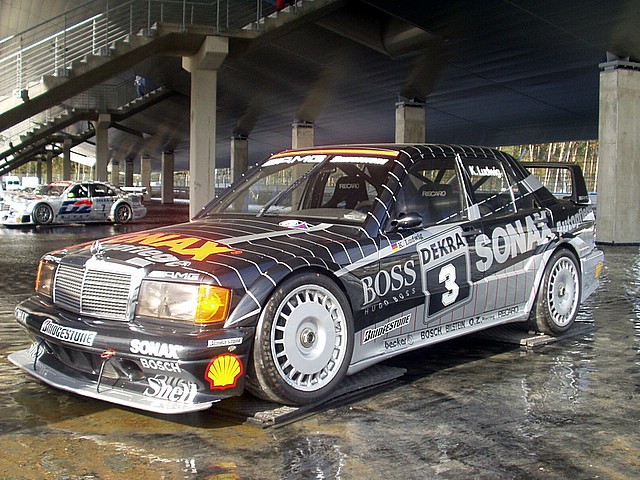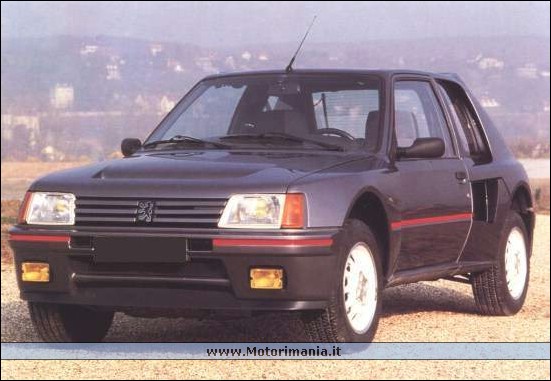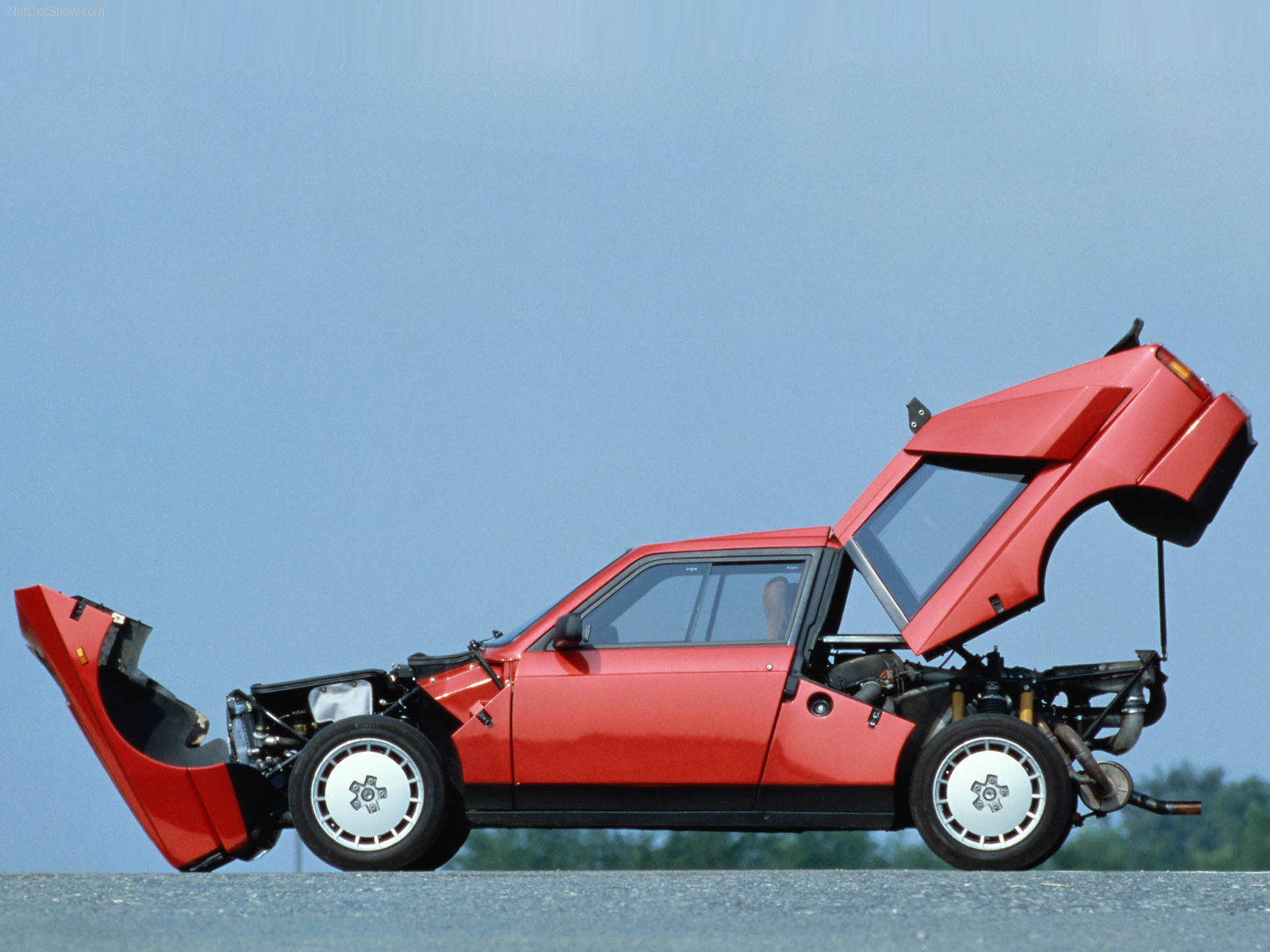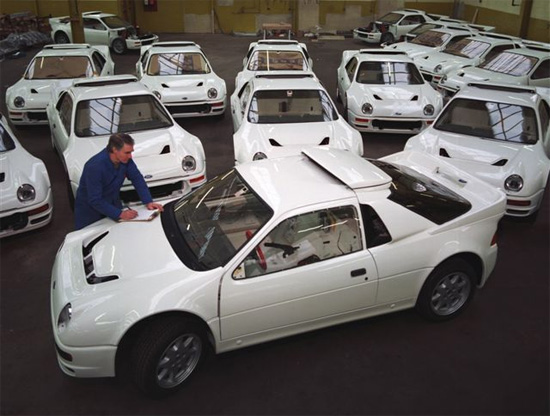How important is motorsport heritage?
Discussion
MikeOxlong said:
Not at all.
You wouldn't nail some fat ugly bint because her mum was fit.
That's the big difference between cars and fit girls, fit girls end up like this:You wouldn't nail some fat ugly bint because her mum was fit.

cars can still look the same after years and years:

but that only counts for the model that did create the heritage, I wouldn't buy a merc that has been build between 2002 and 2006...
It certainly used to be important for car buyers. I was racing a Morgan +4 when radial construction, & new rubber technology gave a vast advance in grip, increasing stress on the suspensions of the then current crop of cars. Morgans when racing, started bending & breaking stub axles, as did MGs & a few other things.
We modified our stub axles, then we advised Morgan of what was successful. They had stronger units in production in weeks.
When testing the original Bathurst 327 Monaros for Holden, we were destroying front tyres in 60 miles on the test track. We found that if we fitted a new tyre to a wheel used once, we would tear the wheel centre apart in just a few more miles. General motors had uprated wheels on all new Holdens in just 6 days. We still only used them once for racing.
When we parked the Monaros with the hand brake on, after a few laps at racing speeds, we found the higher heat we were developing cooked/degraded the bonding material used for the rear linings. As there were no longer rivets used, the linings came off the shoes. GM added rivets to the rear brake shoes of all production cars within a couple of days, while they worked with their supplier to develop a better bonding agent.
I don't know if they still make such findings on production cars raced today, but it sure did improve the breed back then.
We modified our stub axles, then we advised Morgan of what was successful. They had stronger units in production in weeks.
When testing the original Bathurst 327 Monaros for Holden, we were destroying front tyres in 60 miles on the test track. We found that if we fitted a new tyre to a wheel used once, we would tear the wheel centre apart in just a few more miles. General motors had uprated wheels on all new Holdens in just 6 days. We still only used them once for racing.
When we parked the Monaros with the hand brake on, after a few laps at racing speeds, we found the higher heat we were developing cooked/degraded the bonding material used for the rear linings. As there were no longer rivets used, the linings came off the shoes. GM added rivets to the rear brake shoes of all production cars within a couple of days, while they worked with their supplier to develop a better bonding agent.
I don't know if they still make such findings on production cars raced today, but it sure did improve the breed back then.
Edited by Hasbeen on Sunday 29th April 15:47
Edited by Hasbeen on Sunday 29th April 15:50
AndrewW-G said:
Yes you could, like the other manufacturers, they sold a handful of road going versions 

From a quick wiki-hunt:

"Apart from the appearance, the road variants had practically nothing in common with the regular production model and shared the transverse mid-engine, four-wheel drive layout of the rally car, but had less than half the power; at around 200 PS (147 kW; 197 hp)."
Half the power of a group B car - not that I was expecting a full power version, but that was the point I was trying to get across: the £££££ race cars have no bearing on their road-going brethren except brand enhancement.
Also:
"A 207 hp (154 kW) version,[7] the DS3 Racing, was introduced at the 2010 Geneva Motor Show. It is the road version of Citroën's rally specification DS3 R3."
Again, 'road version' is debatable (being 2WD for a start).
Edited by xRIEx on Sunday 29th April 21:58
It's the feedthrough to production vehicles that is the point, as previously mentioned.
I remember, from long ago, that Honda put their young engineers in the competition department, where development is fastpaced and then, after a short time, back into production vehicles so they could put their competition learning to use, in the profit making arena.
Denis Jenkinson once said, to paraphrase, that the performance of today's Formula 1 cars would be the performance of the top road cars ten years hence. He, of course, might not have forseen the possibility of legislation.
That manufacturers, profit driven entities remember, consider motorsport worthy of attention means that they consider it of some importance.
I remember, from long ago, that Honda put their young engineers in the competition department, where development is fastpaced and then, after a short time, back into production vehicles so they could put their competition learning to use, in the profit making arena.
Denis Jenkinson once said, to paraphrase, that the performance of today's Formula 1 cars would be the performance of the top road cars ten years hence. He, of course, might not have forseen the possibility of legislation.
That manufacturers, profit driven entities remember, consider motorsport worthy of attention means that they consider it of some importance.
xRIEx said:
Split opinions there.
Most of the examples are going back 20 or so years, are there any current cars having a similar effect? I'm not aware that Citroen have got any kudos on the back of WRC success, for example.
Think you've hit the nail on the head - maybe motorsport today just isn't popular enough?Most of the examples are going back 20 or so years, are there any current cars having a similar effect? I'm not aware that Citroen have got any kudos on the back of WRC success, for example.
The MG 6's in the BTCC may bring about some interest in the brand, but I very much doubt many people will buy one because of Plato winning...
xRIEx said:
AndrewW-G said:
Yes you could, like the other manufacturers, they sold a handful of road going versions 

From a quick wiki-hunt:

"Apart from the appearance, the road variants had practically nothing in common with the regular production model and shared the transverse mid-engine, four-wheel drive layout of the rally car, but had less than half the power; at around 200 PS (147 kW; 197 hp)."
Half the power of a group B car - not that I was expecting a full power version, but that was the point I was trying to get across: the £££££ race cars have no bearing on their road-going brethren except brand enhancement.
Also:
"A 207 hp (154 kW) version,[7] the DS3 Racing, was introduced at the 2010 Geneva Motor Show. It is the road version of Citroën's rally specification DS3 R3."
Again, 'road version' is debatable (being 2WD for a start).
Edited by xRIEx on Sunday 29th April 21:58

the Delta S4 was also available as a road car
and also.. dont forget Fords contribution

Tartan Pixie said:
Very much so and for good reason. Take a manufacturer like Hyundai who have no major history in motorsport and compare their coupe to similar offerings like the MX5 or Celica, there's just no contest in terms of drivability.
The best engineers in any industry are the ones who have a passion for what they do, as such any manufacturer is going to get the best out of its engineers by indulging their passion for motorsport. For an example look at Toyota's involvement in the East Africa Rally.
Through the 70's and 80's Toyota threw huge sums of money at rallying and was looking at Africa as a key market, hence they needed rugged, reliable cars. I am pretty sure that rallying expertise is a major reason why Africa is full of corollas, hi-lux's and land cruisers, not because people were buying in to a racing image (they weren't) but because the engineers had been pushed to design cars that worked well in that environment. Cars that work well sell.
( East Africa Rally. I miss you. )
)
So that explains why Renault with a vastly succesful F1 programme and a system of rotation for the engineers from F1 to their road car R and D are in the doo doo right now and no one associates them with that racing herritage...only with boring family orientated cars that pretty much fall apartThe best engineers in any industry are the ones who have a passion for what they do, as such any manufacturer is going to get the best out of its engineers by indulging their passion for motorsport. For an example look at Toyota's involvement in the East Africa Rally.
Through the 70's and 80's Toyota threw huge sums of money at rallying and was looking at Africa as a key market, hence they needed rugged, reliable cars. I am pretty sure that rallying expertise is a major reason why Africa is full of corollas, hi-lux's and land cruisers, not because people were buying in to a racing image (they weren't) but because the engineers had been pushed to design cars that worked well in that environment. Cars that work well sell.
( East Africa Rally. I miss you.
 )
)Or that cars like the Porsche 928 from a marque with such racing herritage,very well engineered, a front suspension design derrived from the 70s racing 908s, weissach rear axle following elasto-kinematics, a car fully endorsed by 1980s racing drivers such as Derek Bell was a commercial failure
Hmmm

Yep racing heritage is really great, but if you let the bean counters get the upper hand, they will kill any company. They succeeded with the British industry, are doing the same thing at Renault.
They almost killed Mazda 15 years ago, but once the engineers got back control of what was built, & what quality went into the cars, just look at them now. Quality shopping trolleys that are even worth driving, & good profit statements. Even the ever popular MX5 could not help them with an image, when their daily drivers were so bad.
They almost killed Mazda 15 years ago, but once the engineers got back control of what was built, & what quality went into the cars, just look at them now. Quality shopping trolleys that are even worth driving, & good profit statements. Even the ever popular MX5 could not help them with an image, when their daily drivers were so bad.
Tartan Pixie said:
Very much so and for good reason. Take a manufacturer like Hyundai who have no major history in motorsport and compare their coupe to similar offerings like the MX5 or Celica, there's just no contest in terms of drivability.
The best engineers in any industry are the ones who have a passion for what they do, as such any manufacturer is going to get the best out of its engineers by indulging their passion for motorsport. For an example look at Toyota's involvement in the East Africa Rally.
Through the 70's and 80's Toyota threw huge sums of money at rallying and was looking at Africa as a key market, hence they needed rugged, reliable cars. I am pretty sure that rallying expertise is a major reason why Africa is full of corollas, hi-lux's and land cruisers, not because people were buying in to a racing image (they weren't) but because the engineers had been pushed to design cars that worked well in that environment. Cars that work well sell.
( East Africa Rally. I miss you. )
)
Hyundai Accent Rally Car?The best engineers in any industry are the ones who have a passion for what they do, as such any manufacturer is going to get the best out of its engineers by indulging their passion for motorsport. For an example look at Toyota's involvement in the East Africa Rally.
Through the 70's and 80's Toyota threw huge sums of money at rallying and was looking at Africa as a key market, hence they needed rugged, reliable cars. I am pretty sure that rallying expertise is a major reason why Africa is full of corollas, hi-lux's and land cruisers, not because people were buying in to a racing image (they weren't) but because the engineers had been pushed to design cars that worked well in that environment. Cars that work well sell.
( East Africa Rally. I miss you.
 )
)
I only used the Accent that Hyundai entered, but many private teams used to run them in 2002-2005 era.
Hyundai Veloster?

Hyundai Genisis Drift Spec?

Yeah, I see what you mean. Not much motorsport history is there?

AndrewW-G said:
I've never heard unions described as bean counters before 
Much of the Brit motor industry had a habit of employing the cheapest workers at the lowest possible reward. As with everything, cheap often turns out to be extraordinarily expensive. 
The wonderful BMC comps shop at Abingdon, (the best in the world in it's day, possibly) was, like the rest of that facility there, a very peaceful and trouble-free place, but when the cuts came the comps shop and then the Abingdon plant was amongst the first to go.
The management couldn't have indicated more clearly that the more unionised the workers were the longer they could expect to survive.
Gassing Station | General Gassing | Top of Page | What's New | My Stuff




